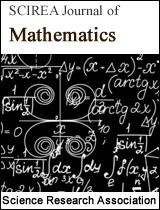Convective heat transfer of Ferrofluids over a Flat Plate with Slip Condition and Radiation
DOI: 337 Downloads 15955 Views
Author(s)
Abstract
The present study considered the thermal convection of ferrofluids along a flat plate subject to uniform heat flux and slip velocity in the presence of radiation with a magnetic field applied in the transverse direction. Two different types of ferrofluids are considered: one magnetic nanoparticle (Fe_3 O_4) and one non-magnetic nanoparticle (TiO_2)that are incorporated within two different kinds of base fluids, water and kerosene oil. Numerical solutions are obtained using a finite difference scheme named Keller-Box method for each mixture of base fluids with Fe_3 O_4 and TiO_2 for the variations of volume fraction, magnetic field, velocity slip, radiation and suction and the results are compared with the available data. The effects of different parameters are presented graphically and discussed.The variation of skin friction coefficient and heat transfer rate, i.e. the Nusselt Number are also shown in tabular form.
Keywords
Ferrofluids, Keller-Box method, velocity slip, skin friction coefficient, heat transfer rate.
Cite this paper
Anika Ferdous, Tania S. Khaleque,
Convective heat transfer of Ferrofluids over a Flat Plate with Slip Condition and Radiation
, SCIREA Journal of Mathematics.
Volume 4, Issue 3, June 2019 | PP. 50-71.
References
| [ 1 ] | Choi, S.U.S., Enhancing thermal conductivity of fluids with nanoparticles,“ASME Publications”, vol.231/66, pp. 99-105, (1995). |
| [ 2 ] | Xuan, Y., Li, Q., Heat transfer enhancement of nanofluids, “International Journal of heat and fluid flow”, vol. 21, pp. 58-64, (2000). |
| [ 3 ] | Tiwari, R., Das, M., Heat transfer augmentation in a two-sided lid-driven differentially heated square cavity utilizing nanofluids, “Int. J. Heat Mass Transfer”,vol. 50, pp. 2002-2018, (2007). |
| [ 4 ] | Ahmad, S., Rohni, A., Pop, I., Blasius and Sakiadis problems in nanouids, “ActaMech”., vol. 218, pp.195-204, (2011). |
| [ 5 ] | Tangthieng, C., Finlayson, B., Maulbetsch, J., Cader, T., Heat transfer enhancement in ferrofluids subjected to steady magnetic fields,“J. Magn. n .Magn. Mater.”, vol. 201, pp.252-255, (1999). |
| [ 6 ] | Kuncser, V., Schinteie, G., Sahoo, B., Keune, W., Bica, D., Vekas, L. and Filoti, G., Magnetic interactions in water based ferrouids studied by Mössbauer spectroscopy, “J. Phys. Condens. Matter.”, 19(1), (2006). |
| [ 7 ] | Li, M., Shi, H. and Zhu, L., Boundary layer velocity distribution of two special ferromagnetic fluid,“Proc. Eng.”, vol.31, pp.166-169, (2012). |
| [ 8 ] | Popplewell, J., Technological applications of ferrofluids, “Physics in technology”, vol.15.3, pp.150, (1984). |
| [ 9 ] | Nadeem, S., Lee, C., Boundary layer flow of a nanofluid over an exponentially stretching surface, “Nanoscale Res. Lett.”, vol.7, pp.94, (2012). |
| [ 10 ] | Khan, W. A., Pop, I., Boundary layer flow of a nanofluid past a stretching sheet, “Int. J. Heat Mass Transfer”, vol.53, pp.2477–2483, (2010). |
| [ 11 ] | Khan, W.A., Khan, Z.H. and Haq, R.U., Flow and heat transfer of ferrouids over a flat plate with uniform heat flux, “Eur. Phys. J. Plus.”, 130(86), (2015). |
| [ 12 ] | Yazdi, M., Abdullah, S., Hashim, I., Sopian, K., Effects of Viscous Dissipation on the Slip MHD Flow and Heat Transfer past a Permeable Surface with Convective Boundary Conditions, “Energies.”, vol. 4, pp. 2273–2294, (2011). |
| [ 13 ] | Ramli, N., Ahmed, S., Pop, I., Slip Effects on MHD Flow and Heat Transfer of Ferrofluids over a Moving Flat Plate, “AIP Conference Proceedings 1870”, (2017). |
| [ 14 ] | Cortell, R., Effect of viscous dissipation and radiation on the thermal boundary layer over a non-linearly stretching sheet, “PhysLett A.”, vol. 372, pp. 631–636, (2008). |
| [ 15 ] | Na, T. Y. Computational methods in Engineering Boundary value problem, “New York: Academic Press”, (1979). |
| [ 16 ] | Cebeci, T. and Bradshaw, P. Physical and Computational Aspects of Convective Heat Transfer,“New York:Springer”, (1984). |
| [ 17 ] | Keller, H.B., Cebeci, T., Accurate Numerical Methods for Boundary layer Flows,Ⅱ: Two-Dimensional Turbulent Flows, “AIAA Journal.”, 10:1193-1199, (1972). |
| [ 18 ] | Oztop, H. F., Abu-Nada, E., Numerical study of natural convection in partially heated rectangular enclosures filled with nanofluids, “International Journal of Heat and Fluid Flow”, vol. 29, 5, pp. 1326–1336, (2008). |
| [ 19 ] | Blasius, H., Math, Z., Phys., vol. 56, 1, (1908). |
| [ 20 ] | Cortell, R., Numerical solutions of the classical Blasius flat-plate problem, “Applied Mathematics and Computation”, vol. 170, pp. 706–710, (2005). |
| [ 21 ] | Rahman, M., Locally similar solutions for hydromagnetic and thermal slip flow boundary layers over a flat plate with variable fluid properties and convective surface boundary condition,“Meccanica.”,vol. 46, pp. 1127-1143, (2011). |
| [ 22 ] | Rosseland S.Astrophysik und atom-theoretischeGrundlagen,“Berlin: Springer”, (1931). |

